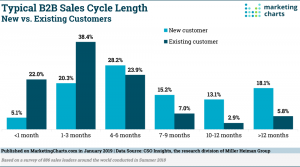What Makes B2B Customer Service Different and How to Effectively Succeed at It

Whereas B2C involves selling to individual consumers, B2B involves selling to businesses, which comes with very different challenges.
For example, B2B customer service is vastly different from B2C customer service in many ways.
You might assume that, because you’re dealing with business people rather than the general public, the customer service would be less daunting. However, it is just as testing, but for different reasons.
In this article, we’ll go over how B2B customer service is different from B2C and then explain how you can effectively succeed in the field, making money and connections along the way.
What Makes B2B Customer Service Different?
-
Niche market
One thing that differentiates B2C from B2B customer service is that B2B is usually a very niche market with few potential customers. This is due to its inherent nature; you’re not selling to everyone and their dog. Instead, you’re selling to businesses, of which there are fewer than there are individuals.
This affects customer service because it makes the number of opportunities much smaller. Customer service will need to be highly targeted, and employees need to be trained to help clients with these highly specialized products.
This may also mean scaling back or even outsourcing your operations if you’ve been serving a B2C audience. Certain software packages can be significantly cut, and if you use them, check out some B2B SaaS pricing models to see if you can economize.

Less PR required
B2C requires a constantly shrewd public-facing identity, with customer service agents trained to embody the values and message of the company when working in an ecommerce customer service call center, for example.
Brands have to be very careful about how they come across, from their advertising to their customer service. For example, in a February 2022 study, 55% of companies stated that consistency across channels was the most important attribute of the customer experience.
However, unlike with B2C, because your audience is so small with B2B, you don’t need this steely veneer.
Your customer service can be more casual and personality-led, rather than restricted and conservative. You can be more free and easy, tailoring your customer service style to each client.
Stronger relationships
In B2B situations, one of the bosses of the operation or office will make all the decisions about which company to go with. All your communications will be with this person, and they’ll get the final say for the whole deal, which will likely be a large-volume order.
Because so much time is spent communicating with this person and convincing them to buy, you’re more likely to get close to them and form stronger relationships. This differs from B2C, in which you usually help customers on a short-term basis.
The below graph shows how long a B2B sales cycle, i.e., closing the deal and getting a client to buy, can take. It is all part of sales prospecting. It can require a lot of work, usually taking longer than a month and sometimes taking up to 12 months, so effort and time must be invested in this.
Logical purchases rather than emotional
A key difference is that B2B decision-makers think with logic rather than emotions when they’re choosing products. B2C clients, meanwhile, are driven by their needs and desires; it’s more of an emotional response.
This means that your customer service will need to be straightforward and appeal to the client’s desire to get something sorted and get it right the first time. Remember that the purchase is a part of their job, so they probably just want to get it out the way! A streamlined process, including frictionless digital payment, will appeal to them. If they pay for an ongoing service, you can automate regular payments through a recurring payment provider.
There’s, therefore, no need for a great number of flourishes and formalities with the client as you might do with B2C. Just ask them what they want, and provide them with something that fits.
Larger volumes of products sold
As you’re providing products to a large number of people, there will be a wholesale-style operation required. You’ll need to keep in close communication with the client about the products and the logistics of delivering them. This means being alert to any possible barriers to distribution.
It also means that a higher level of organization is required when it comes to customer service. Some days, you may feel overloaded by the sheer volume of stock and the need to get it out there.
Find a way to organize your operations effectively and avoid becoming overwhelmed, as this may lead to customer service faux pas if you’re not careful. The massive amount of stock may also mean that you need to have contingencies in place, such as a business continuity plan.

How to Effectively Succeed at B2B Customer Service
Research how to meet their needs
Conduct research on your customers. It will help you understand their needs. This is critical to delivering effective customer service to your B2B clients. You’ll need to understand what their motives are for buying the product and what specialized information they’ll require when they call.
You can carry this out by providing surveys to potential or current customers and asking them about what they’re looking for in their business operations, possibly via a voice call. What kind of service or extras would they like to see from you when you deliver your service?
With this information in mind, you should be able to hit the nail on the head with your customer service.
Use your charisma
Due to the nature of these close, tight-knit relationships, you’ll need to have a warm personality to build a rapport. Although it’s a product that you’re selling, your client will also buy based on your relationship with them, as it’s likely that you’ll have things to discuss in the future. The client will be more interested in a business relationship with someone who they genuinely like and who they feel that they can count on in the future, or if anything goes wrong.
You need to tap into the heart of the individual and meet their rational business needs. Try and work on your skills gap to improve your interaction and communication skills.
The importance of being likable and helpful should not be underestimated. It could make the difference between securing a contract and losing out to the competition.

Be proactive and contract-driven
You’ll need to go out of your way to secure new clients. They won’t come to you. Generate more leads and follow up quickly. If a business is looking for a product or service, or they aren’t happy with what they’re currently getting, they’ll be more open to an offer, so you need to be constantly ready for that moment.
Being proactive in this way is a great way to show potential clients what level of customer service they can expect should they decide to buy from you. You’ll be able to show that you’re someone passionate about the product and good at communication, which are two key factors that may swing a potential deal.
Beat the competition
Because decision-makers in businesses think so rationally and logically, without too much emotion, they’ll constantly be trying to find the best, most appropriate deal. This means that you’ll have to keep up with the competition to keep those contracts going and not lose out.
Specific things will need to be perfected to attract business people to your company over another. This can include things like improving your website traction using conversion rate optimization services or improving the targeting of your adverts. You should also appear credible in the eyes of your customers, which SEO is an effective method to result in. So it’s time to invest in link building and link tracking through Backlink Management Tools. Equally, make sure your customer service is top-notch, and you’ve got great relationships with your clients to differentiate yourself from the competition.
Ask clients about the competition, too. A friendly client might be willing to share what competitors are offering or if anyone has approached them. However, make sure to do this appropriately and politely.
Nurture your reputation
In the B2B world, reputation is everything. Businesses often communicate with each other, and within businesses, people talk. You need to ensure that they’re saying good things. Although PR isn’t important in B2B in the traditional sense, giving off a good impression in your industry via excellent customer service will stand you in good stead and allow you to increase your scope.
Part of consistently great customer service is feedback, and you can communicate with clients to ask them about your reputation in the field. Would they recommend you to a friend, for example? As with the last point, it’s best to approach only those clients you feel comfortable with.
The below image reveals how important reputation is when going against the competition.

The Product Comes First!
As the above shows, providing high-quality customer service to B2B clients involves cultivating different kinds of relationships and working to foster customer trust, as well as improving your straightforward, logical service to meet client needs.
Having said this, there’s no point in spending all this time working on your customer service if your product doesn’t fit the bill.
The main focus of any company should be what it’s selling, and B2B is no different in this respect. If you have an inferior product, you simply won’t be able to compete, and it’ll all be for nothing.
You should only really put all your energy into customer service once you know that you’ve got the fundamentals of the business right – something that takes a lot of work.
